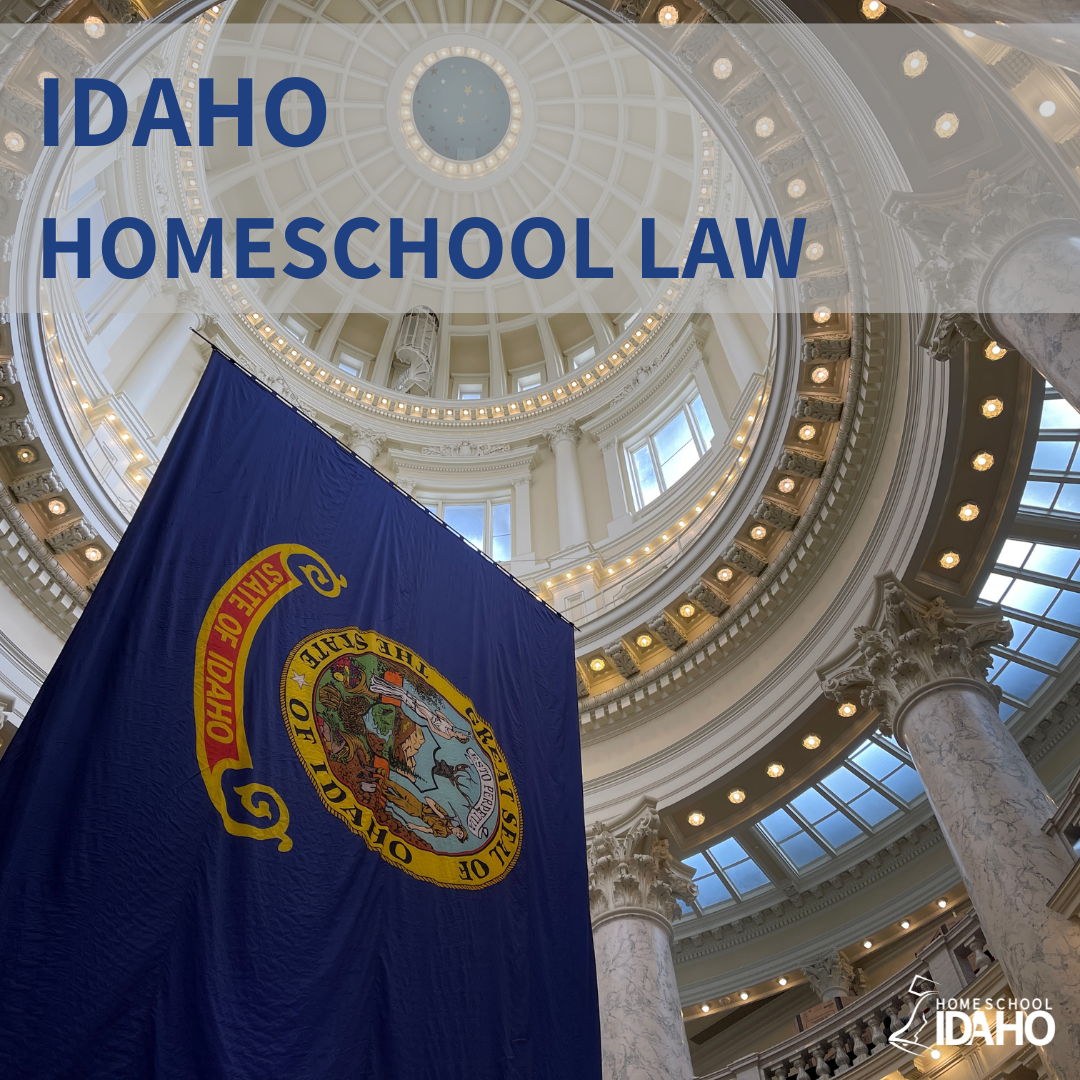Idaho Homeschool Law
Parent Requirements

Paperwork Requirements
Idaho law does not require any notification in order to begin or continue homeschooling. No test scores or work samples need to be filed. However, if your child is already enrolled in an Idaho public school, best practice is to notify the school in writing that you intend to provide his or her instruction at home. This will help to avoid the appearance and/or accusation of truancy. You may withdraw from public school at any time. You are not required to provide any information about what curriculum you intend to use, your education level or teaching experience, or anything else about your home or homeschool. In order to preserve the minimal requirements we have in Idaho, be careful to avoid providing more information than that which is required by law.
Age Requirements
Idaho’s compulsory attendance law affects children between the ages of 7 and 16. Your child is considered “school age” and must be receiving instruction if they are 7 years old by the time public school starts in your district, or if they have not yet reached 16 years old. Idaho law does not dictate what grade is assigned to the age of students that homeschool, so you are free to instruct your child at the “grade level” that best meets their abilities.
Oversight Requirements
Idaho law does not include government oversight requirements for privately homeschooling parents. Neither the Idaho Department of Education nor the local school district have the authority to evaluate or approve anything about your homeschool. As the parents or guardians, you assume sole responsibility for the funding, administration, and teaching in your homeschool. You are free to operate your homeschool with the curriculum, schedule, and style that most fits your family. Remember that you do not have to conform to expectations others may have about what home education should look like. In fact, homeschool leaders in Idaho worked with the Idaho Dept. of Health and Welfare to establish guidelines that will help social workers avoid making false assumptions about homeschoolers.
Subject Requirements
Idaho code states that instruction shall be “in subjects commonly and usually taught in the public schools.” The law does not define for private homeschoolers what that instruction shall be, nor does it specify any order, achievement level, or topics to be included for each subject area. You are free to set the pace and sequence that will best meet your students’ needs. Below are the main subjects required for Idaho public school students. As a homeschooler, you are free to include many other subject areas to enrich and challenge your students according to their needs and interests. In fact, you will likely find their love of learning will outpace the number of hours you have in the day to teach them!
Language Arts
This broad category includes everything from beginning readers to advanced composition writing. Young kids learn to read at very different ages, and homeschooling in Idaho gives you the freedom to let them learn confidently at their own pace. Literature and writing at the high school level should be planned to meet the students’ needs for college entrance, workplace communication, and life skills.
Math
Specific content for age/grade is not mandated for homeschool students. For the high school years, it is important to decide with your student his or her goals post-high school, and plan accordingly. Many parents include math courses as if their student was planning to attend college even if the student is not sure of his future plans.
Science
No specific sequence or topic of science instruction is mandated for homeschool students in Idaho. Homeschool parents are free to enjoy science as they discover it in the world around them for younger kids, and direct science courses for older students according to their interest and future career plans.
Social Studies
Parents are free to include aspects of history and government in the order and emphasis that best fits their goals for their homeschool.
Time Requirements
Graduation Requirements
Idaho law does not specify homeschool graduation requirements. Public school graduation requirements are not applied to privately home educated students. An SAT or ACT is not required to graduate. As the administrator and teacher of your homeschool, you are solely responsible to plan your students’ high school courses, assign grades or assess their work, and write their transcripts. The transcript and diploma you write certifying your students’ completion of your requirements are legally binding and acceptable as proof of graduation. You should make your school documents professional and business-like, much as you would make your resume look professional. Since Idaho law includes home education as a legal means of providing a high school education, your documents are just as legal and official as any other legal school in the state.
Obtaining a GED is neither necessary nor recommended. For some post-high school tracks, such as military enlistment, having a GED can actually be a detriment. Your high school student is a bona fide high school graduate when they have met your requirements, and to have them get a GED is stating that your homeschool was not sufficient or complete. You will need to check with individual colleges your student may be interested in to find further entrance requirements, such as SAT or ACT test scores.
Assessment Requirements
Idaho law does not require homeschool students to take standardized tests. You may choose whether to test, how often to test, and the test in which to participate. However, if you choose to participate in public school activities, such as sports, the public school has the legal right to require of your student the same qualifications that are required of the public school students. One of the requirements might be to submit scores from a standardized, nationally-normed test.
Vaccination Requirements
Part-Time Public School Participation
Idaho law allows public school districts to require homeschool students to meet the same standards required of public school students. This means homeschool families will come under regulation and oversight not otherwise required. Homeschool families will do well to consider private alternatives for their students. The homeschool community in Idaho has a broad variety of opportunities from private sources, including sports, dance, theater, science, computer programming, and much more!
Special Education
According to the Idaho State Department of Education, nonpublic school students may not use the dual enrollment statute to receive special education services.
Homeschool families should recognize that a custom education at home will be able to meet the needs of all students, including disabled and gifted students, far better than public schools will. Loving parents will be able to know their students best, and will be able to set a pace and choose materials that strengthen any weak areas, as well as challenge gifted students to grow to their potential.
Driver's License Requirements

Public School Programs
According to Idaho state law, students in public, on-line or virtual charter schools, and programs provided through public schools are considered to be public school students, and are subject to all requirements of Idaho’s public school students. Even though the instruction takes place in the home, students in these programs are under Idaho public school requirements. Families are free to choose programs that are extensions of the public schools, but their students are then legally classified as public school students.
Parents are free to homeschool without notifying the state, and without being regulated. Homeschool parents are free to school on their own schedule, select their own curriculum, use faith-based materials, set their own graduation requirements, and customize to both disabled and gifted students. With such tremendous freedom, there is much to lose! Each year during Idaho’s legislative session, from January through April, you have the opportunity and responsibility to know who your legislators are, and to follow the bills they introduce. Idaho legislators value the support of homeschool families, and we have a history of making our voices heard!